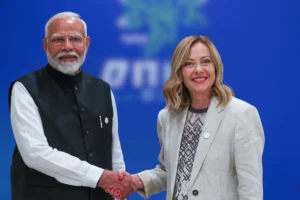
Denis Alipov
In the lead-up to the G-20 summit in New Delhi, Russian Ambassador Denis Alipov voiced strong opposition to Western efforts to prioritize the Ukraine crisis within the multilateral platform. He emphasized that the G-20’s tradition focuses on economic and financial matters, not political issues. Ambassador Alipov suggested that the language of the Bali Declaration 2022, which mentions Ukraine, should be revised for the upcoming G-20 meeting.
“Unfortunately, the Indian Presidency in the G-20 has faced significant pressure from certain countries that, in Russia’s view, have steered the G-20’s agenda towards making the Ukrainian crisis a top issue. The G-20 should concentrate on economic and financial issues. However, since last year, some group members decided to discuss political issues within the G-20, something we do not accept. If there is no consensus on an item, it should be removed from the agenda, considering that political issues have never been discussed in the G-20,” Ambassador Alipov stated during a media interaction at the Foreign Correspondents Club (FCC). He added that even if the majority of G-20 members support an item while a few, like Russia, stand against it, such an item should not be included on the G-20 agenda.
Regarding the Bali Declaration of 2022, he expressed Russia’s disapproval and called for changes to the section that some Western countries wish to retain.
Ambassador Alipov’s assertive articulation of Russia’s position ahead of the summit hinted at the approach the Russian delegation, led by Foreign Minister Sergey Lavrov, would take during the summit. President Vladimir Putin, due to ongoing “special military operations” in Ukraine, conveyed his inability to attend the summit.
The ambassador highlighted Russia’s support for a “just and equal” international order, exemplified by the expansion of the BRICS and SCO groupings. He acknowledged India’s growing influence and its legitimate voice in global politics and the United Nations, reiterating Russia’s consistent support for India’s full membership at the UN Security Council.
While expressing hope for the success of the G-20 summit, Ambassador Alipov noted that the government of Prime Minister Narendra Modi had not proposed any peace plan for resolving the Ukraine conflict. He dismissed President Zelensky’s 10-point formula as “nothing but a set of ultimatums” unsupported by Russia.
“The success of the G-20 largely depends on the goodwill of those insisting on ‘non-consensus’ issues on the agenda. We have strongly supported India’s priorities at the G-20, and we hope the outcome will reflect India’s agenda,” Ambassador Alipov stated.
He also defended Russia’s relationships with both New Delhi and Beijing, describing them as “wholesome” and asserting that Russia would not sever ties with India, even in the event of hostilities between India and China.
“Russia may not always agree with India’s actions, and India may have concerns about developments within Russia, but the Indo-Russian bond has never been affected by geopolitical changes,” Mr. Alipov concluded.
To read more such news, download Bharat Express news apps


















